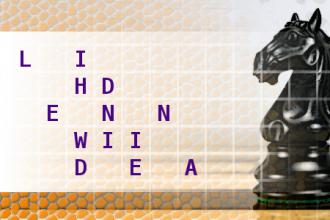Chess Knight Move
Find the country and its capital city, using the move of a chess knight. First letter is I. Length of words in solution: 5,3,5.
Restroom Talk
I was barely sitting down when I heard a voice from the other stall saying: 'Hi, how are you?'
I'm not the type to start a conversation in the men's restroom, but I don't know what got into me, so I answered, somewhat embarrassed, 'Doin' just fine.'
And the other guy says: 'So what are you up to?'
What kind of question is that? At that point, I'm thinking this is too bizarre so I say: 'Uhhh, I'm like you, just traveling.'
At this point I am just trying to get out as fast as I can when I hear another question. 'Can I come over?'
Ok, this question is just too weird for me but I figured I could just be polite and end the conversation. I tell him, 'No........I'm a little busy right now!!!'
Then I hear the guy say nervously...
'Listen, I'll have to call you back. There's an idiot in the other stall who keeps answering all my questions.'

